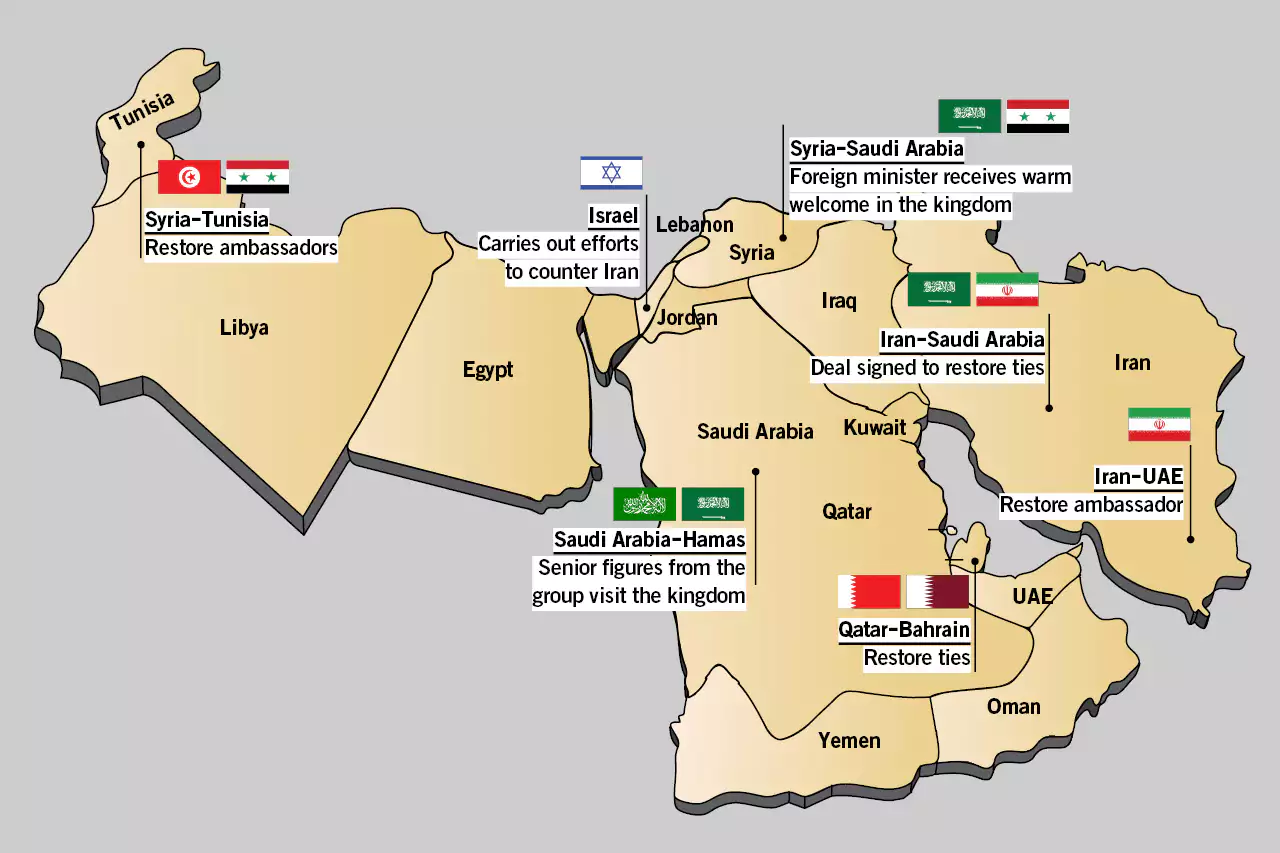Ahmad Naveed Cheema
The Israeli-Palestinian conflict is one of the most intractable and long-standing conflicts in the world. The conflict has had a devastating impact on both Israelis and Palestinians, and it has also had a ripple effect throughout the Middle East and beyond. A peaceful resolution to this conflict is essential for the region’s stability, the safety of its people, and the world at large.
Over the years, militant groups like Hamas and Hezbollah have used the Israeli-Palestinian conflict as a justification to fight against Israel, whom they believe carrying on an oppressive cleansing of Palestinians against international law and morality. Meanwhile, it is further ignited by the settlers continuing to expand settlements into Palestinian land, further inflaming tensions. This violence has only served to prolong the conflict and create a breeding ground for extremism.
The conflict has also had a destabilizing effect on the region, leading to the displacement of millions and contributing to the rise of extremist groups like ISIS and others. It has strained the relationships between neighbouring countries, hindering regional cooperation on critical issues such as trade, security, and energy. Furthermore, the West has always patronized Israel, which is why there is a growing discontent between Islamic countries and the West.
Jerusalem is considered one of the most important cities in the world, and it holds a special significance for Jews, Muslims, and Christians. For Jews, it is the holiest city, and it is the site of the Western Wall, which is the last remaining remnant of the Second Temple. For Muslims, it is the third holiest city, and it is home to the Al-Aqsa Mosque, which is believed to be the place where Prophet Muhammad ascended to heaven. For Christians, it is the place where Jesus was crucified, buried, and resurrected, and it is home to the Church of the Holy Sepulchre. As such, Jerusalem is a city of great religious and cultural importance, and it is a symbol of the shared history and heritage of the Abrahamic religions. However, the city has also been a source of conflict between Israelis and Palestinians, who both claim it as their capital, and it remains a contentious issue in the Israeli-Palestinian conflict.
However, the Israeli-Palestinian conflict is not just a regional problem. It has become a global issue. Despite repeated attempts, the United States and other major powers have been unable to broker a lasting peace. This has led to a sense of frustration and hopelessness, as people worldwide see it as a symbol of the international community’s inability to solve complex problems.
A peaceful resolution to the conflict can only be achieved through dialogue and compromise. The international community must support both Israelis and Palestinians in their efforts to achieve lasting peace. A comprehensive solution must address the root causes of the conflict, including the Israeli occupation, the status of Jerusalem, and the right of return for Palestinian refugees.
Additionally, a peace agreement must ensure the safety and security of both Israelis and Palestinians. This includes addressing the issue of terrorism, ending the blockade of Gaza, and providing economic opportunities for Palestinians.
Finally, a peaceful resolution to the conflict would have far-reaching positive consequences. It would reduce extremism, stabilize the region, and demonstrate the power of diplomacy and international cooperation. It would also bring hope to millions of people who have suffered for far too long.
Therefore, a peaceful resolution to the Israeli-Palestinian conflict is essential for the region’s stability, the safety of its people, and the world at large. The international community must continue to work towards a peaceful solution, supporting Israelis and Palestinians in their efforts to achieve lasting peace. It is time for the world to come together and show that peace is possible.
The recent escalation of tensions between Israel and Iran has led to concerns of a potential regional war with global repercussions. With Israel having carried out a series of attacks on Iranian targets in Syria, the most recent being the air strike on the Iranian consulate in Damascus, it is clear that the country is seeking to establish military hegemony in the region.
In response, Iran launched an attack from its territory, which demonstrated its military capabilities and provided space for de-escalation. However, the display of military power by both Israel and Iran has left the rest of the Arab world terrified of what another regional war could do to an already devastated region.
To prevent a potential catastrophe, the international community must act quickly. The United Nations Security Council should pass a robust and binding resolution imposing a complete ceasefire in the region that includes the occupied Palestinian territories, Israel, Iran, and all neighbouring countries involved, as well as non-state actors.
Importantly, this resolution must recognize that at the core of much of the instability in the region is the unresolved Palestinian question. Therefore, it should call for an end to Israel’s invasion of Gaza and the exchange of captives, provide a clear roadmap to Palestinian statehood, and end the Israeli military control of all Arab territories occupied in 1967. It must also create an international peacekeeping force that will ensure compliance by all parties, especially in Gaza but also in the West Bank, where settler violence has reached unprecedented levels.
An explicit declaration in support of the Palestinian right to self-determination and a roadmap to its realization is paramount now. A new resolution, therefore, will require the use of Chapter VII of the UN Charter, which allows for the use of biting sanctions and a diplomatic boycott on those who do not abide by its provisions. Additionally, mention must be made of the other provisions in Chapter VII, which include using military force to ensure the maintenance of international peace.
For decades, Israel has gotten away with perpetrating egregious violations of international law because it has faced no consequences. The resolution must be binding, and explicit measures must be undertaken in case of a breach. Iran already faces sanctions pressure from the West, but if China and other non-Western powers were to join such measures, it would think twice before violating the resolution.
With Iran’s willingness to de-escalate after the recent attack, a small window of opportunity exists for action. The US and other countries have come to the rescue of Israel, and this means that it will have to comply with the ceasefire. Unless the world wants to deal with the economic and humanitarian catastrophe of a region-wide war in the Middle East, it must move quickly and lay the foundations for a comprehensive, lasting peace in the region. The key to that is resolving the Palestinian question once and for all.
Please, subscribe to the YouTube channel of republicpolicy.com
















































